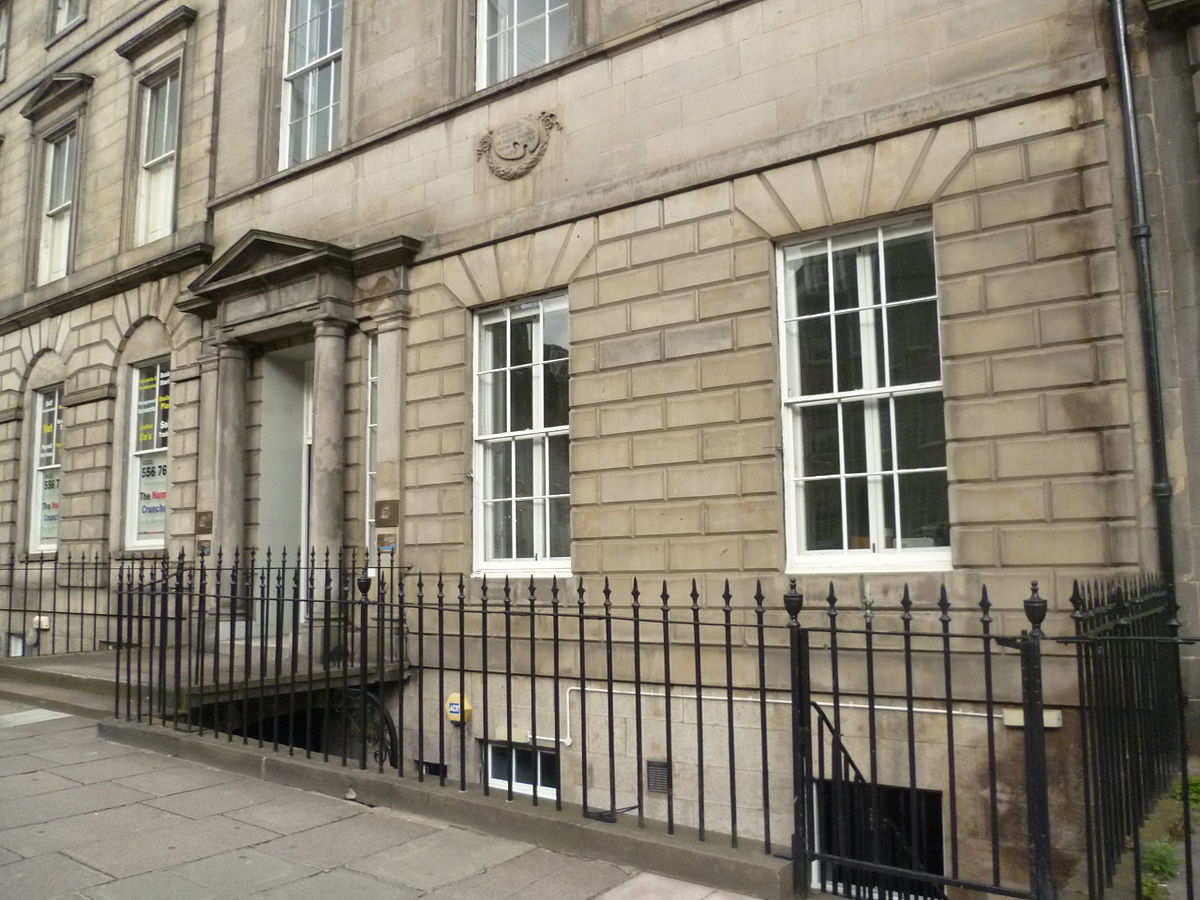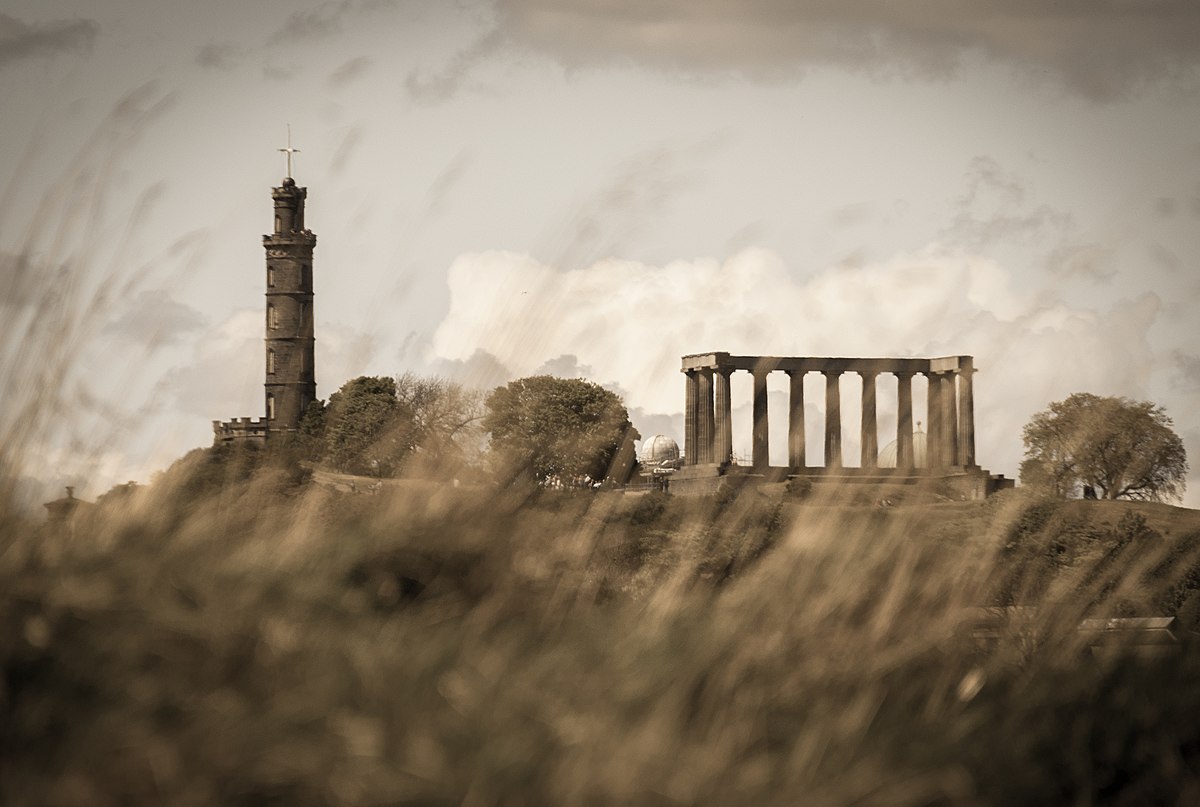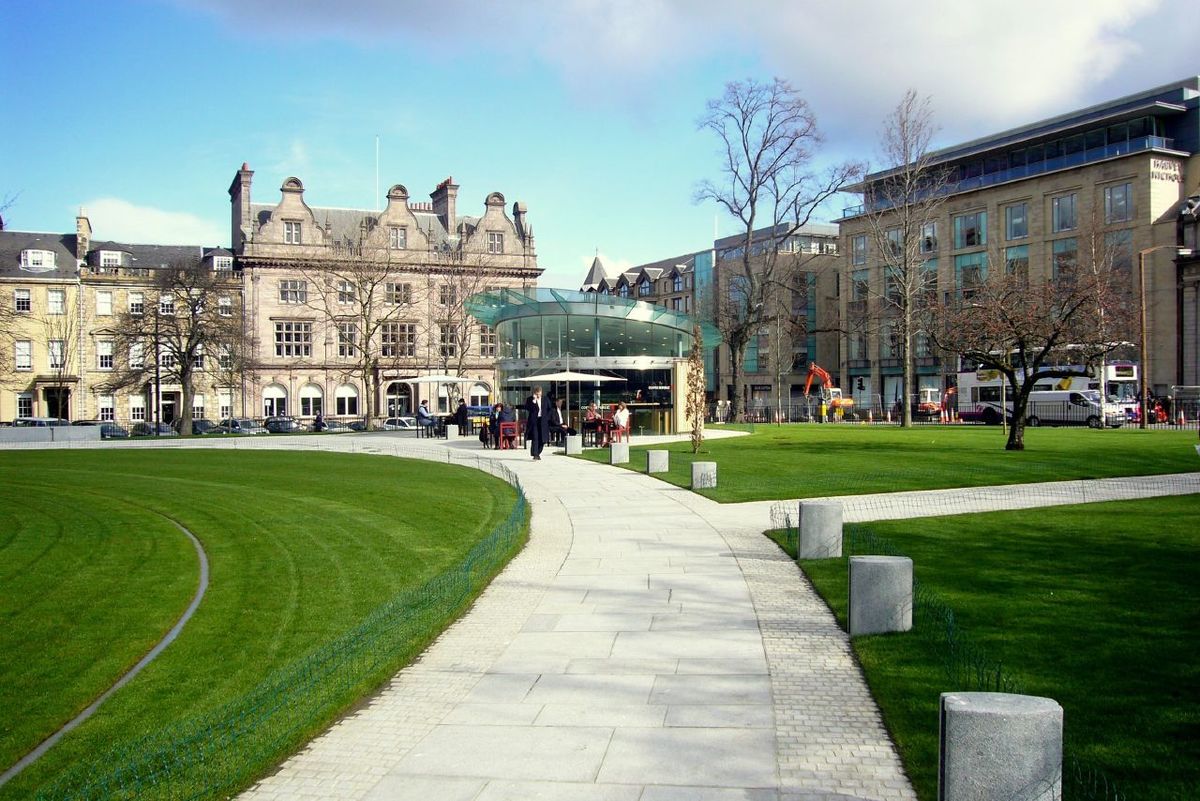
St. Andrew Square
Photography: John Lord, Wikimedia Commons (BY-SA)
St. Andrew Square
St. Andrew Square was the first section of James Craig’s New Town design to be built. It rapidly became a desirable address and various key figures of the Enlightenment resided here. On the east side of the square is a mansion, Dundas House, built in 1774 to the design of Sir William Chambers (1723 -1796) for Sir Lawrence Dundas of Kerse (1710 – 1781) and described in 1780 by Hugo Arnot as "incomparably the handsomest townhouse we ever saw". William Chambers was a prominent architect of the era and a competitor of the Adam style, being more influenced by the neoclassicism of continental Europe.
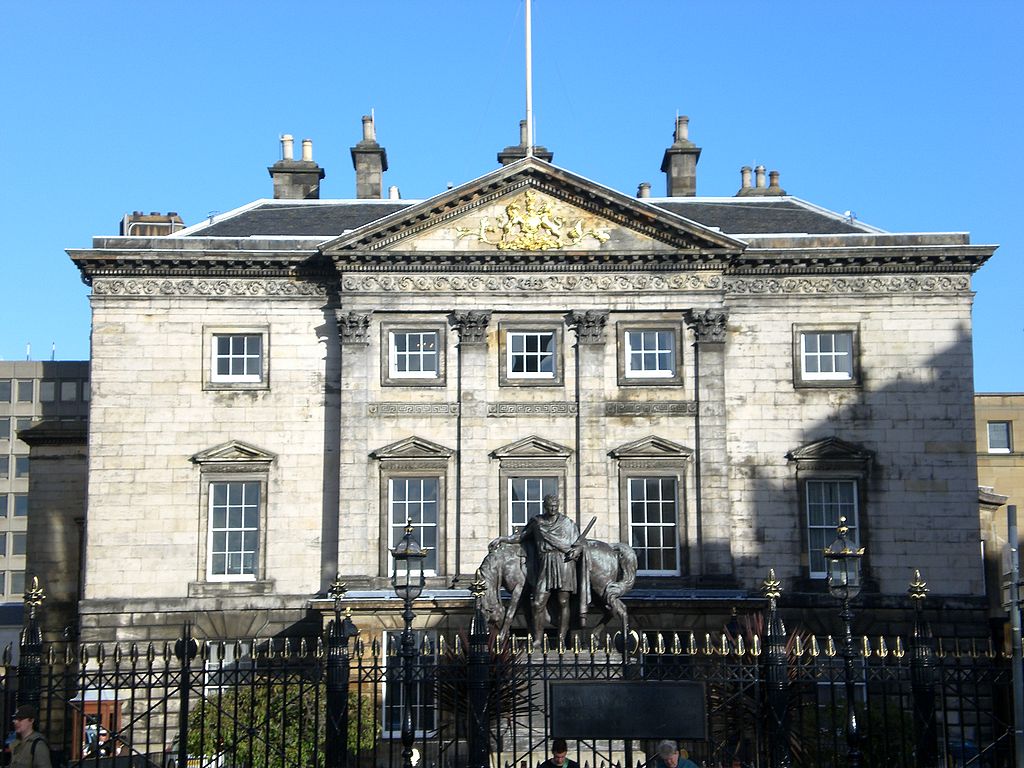
The Dundas House
Registered Head Office of the Royal Bank of Scotland Group PLC and the Royal Bank of Scotland PLC
Photography: Thunderwing, Wikimedia Commons (BY-SA)
Sir Lawrence Dundas was an entrepreneur, property investor and banker. He was Governor of the Royal Bank of Scotland from 1764 to 1777. That bank had been established in 1724 with strong Whig ties in competition with the Bank of Scotland, known to have Jacobite sympathies. It is credited with the invention of the overdraft in 1728 and interestingly its headquarters are now located in Dundas House, which the bank acquired in 1825.
In the centre of St. Andrew square there is a monument to another, albeit unrelated Dundas, Henry Dundas 1st Viscount Melville (1742–1811), advocate, politician and promoter of the Scottish Enlightenment, who was labelled somewhat sarcastically by various sobriquets such as "Grand Manager of Scotland", the "Great Tyrant" and "The Uncrowned King of Scotland" on account of his evident power and the manner in which he used it. He was even less generously described by James Boswell as a “coarse, unfettered, unfanciful dog” at the time of Dundas being appointed Lord Advocate of Scotland.
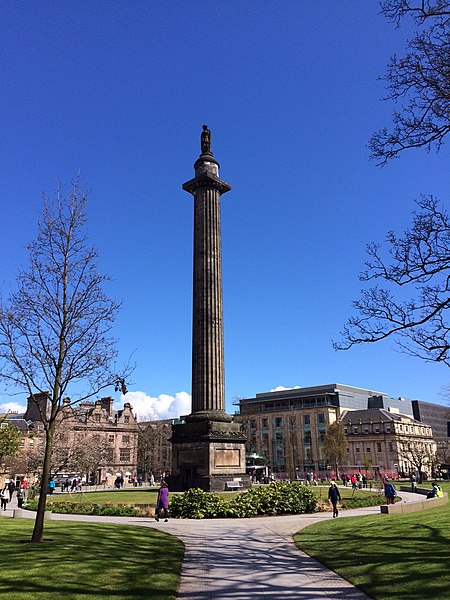
Henry Dundas Monument
Photography: Gareth Davis, Wikimedia Commons (BY-SA)
Among his many activities, as Britain’s first Secretary of State for War, he pursued war against France, while also campaigning against the abolition of slavery and commercially exploiting Britain’s colonial reach in India, principally as President of the Board of Control over the East India Company from 1793-1801. Unfortunately, he was impeached in 1806, accused of misappropriating public money and although subsequently acquitted, the charges related to the withdrawal of enormous sums (£15 million over two decades, equivalent to just under £2 billion pounds in today’s money) from the Bank of England, which were then deposited in his private bank account with Coutts and used to speculate in the East India Company.
He is a reminder that some key figures of the Enlightenment were perhaps not quite so enlightened. Despite all of this, the 150-foot high, Melville Monument in St. Andrew Square, erected in 1821 by the officers and seamen of the royal navy, is topped by a statue of Henry Dundas and is by far the tallest monument of the city. A recently published series of essays, Recovering Scotland’s Slavery Past – the Caribbean Connection, edited by the Scottish historian T.M. Devine has highlighted the fact that many of the supposedly enlightened Scottish elite benefitted handsomely from the slave trade. Moreover, after the abolition of slavery in 1833, “compensation” was paid to slaveholders through a government fund of £20 million (£16.5 billion in today’s terms). According to Sir Geoff Palmer, Emeritus professor in the School of Life Sciences at Heriot-Watt University, the compensation list included 320 Edinburgh addresses belonging to 148 individuals and the grandeur of some of these individuals’ homes was frequently distinguishable when compared to other homes of the New Town.
From Dundas House please walk a further 150 metres anticlockwise to number 23 of St. Andrew Square, the house were Sir Henry Brougham was born.
Sir Henry Brougham
"Education makes a people easy to lead, but difficult to drive; easy to govern but impossible to enslave."
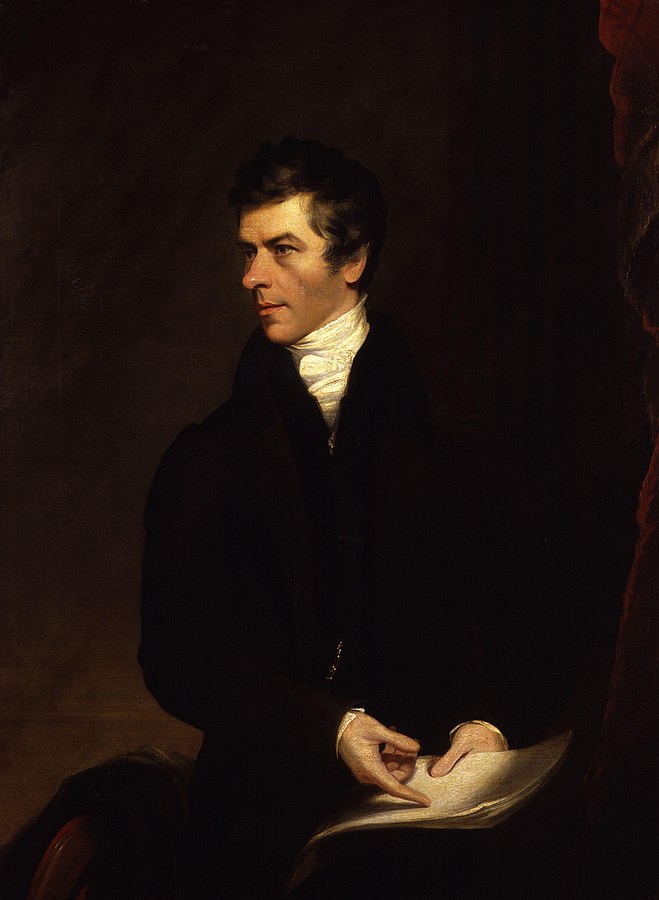
Henry Brougham, 1st Baron Brougham and Vaux, by James Lonsdale
London, National portrait Gallery
Despite the negative aspect displayed by some of the elite of the Edinburgh Enlightenment with regard to the slave trade, others played crucial redeeming roles. The quotation above belongs to one of the great sons of the Edinburgh Enlightenment, Henry Brougham, 1st Baron Brougham and Vaux, (1778 – 1868), one of the founders of the 1802 Edinburgh Review, Lord Chancellor of Great Britain from 1830 to 1834, ardent slavery abolitionist, one of the founders of the Society for the Diffusion of Useful Knowledge in 1825 and of University College London in 1828, designer of the four-wheeled, horse-drawn carriage eponymously named the Brougham and the first patron of Cannes, leading to its transformation from a fishing village to international resort. Brougham was born at 23 St. Andrew Square on 19th September 1778, as commemorated by a plaque on the front elevation.
Brougham inveighed against the slave trade in his book An Inquiry into the Colonial Policy of the European Powers published in 1803. Much later in 1838, faced with evidence of the ineffectiveness of the abolition process, he stated in the House of Lords:
"The slave … is as fit for his freedom as any English peasant, aye, or any Lord whom I now address. I demand his rights; I demand his liberty without stint… I demand that your brother be no longer trampled upon as your slave!"
The Society for the Diffusion of Useful Knowledge was established in order to assist poorer people in their own self-education efforts by publishing inexpensive, scientific, historical and geographical textbooks. Eventually the Society’s numerous members facilitated the dissemination of ideas about Western science and civilization throughout the British Empire.
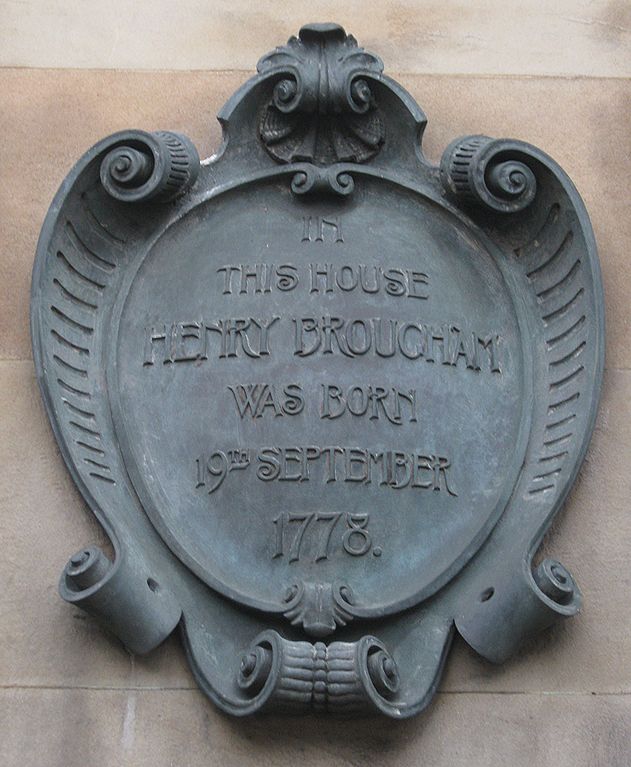
Plaque of Sir Henry Brougham
Photography: gnomonic, Wikipedia Commons (BY-SA)

Immediate emancipation
The speech of Lord Brougham in the House of Lords, on Tuesday, February 20th, 1838, on slavery and the slave-trade : prepared from the most full and accurate reports, and corrected by his lordship.
Source: Internet Archive
